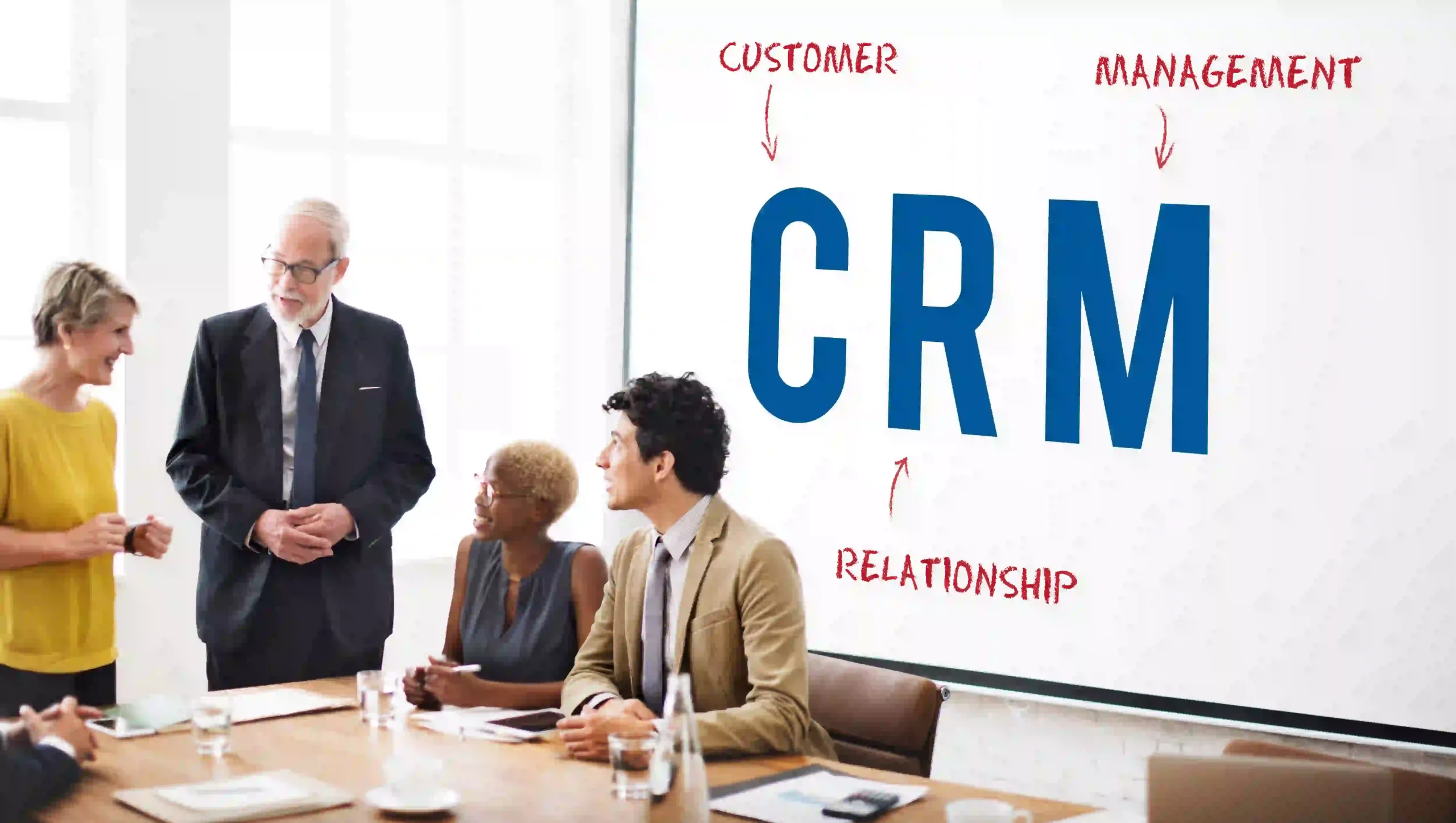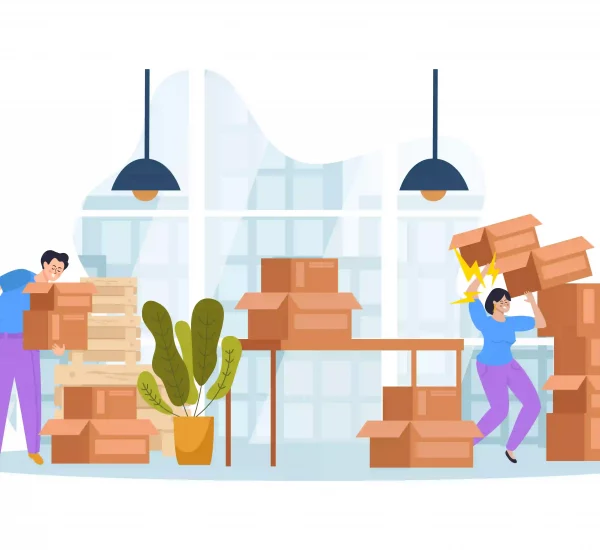Answer these 2 quick questions!
1- Are your B2B sales cycles dragging on too long (even more than 3-23 weeks), costing your team time and energy (that could be used otherwise in generating sales)?
2- Do your sales reps spend more time on paperwork and administrative tasks than on actually selling and nurturing customer relationships?
If that’s the case, you are in dire need of a system or strategy that keeps marketing, sales, service, and operations aligned (on the same page).
And that’s exactly what B2B Customer Relationship Management is for.
What is B2B Customer Relationship Management
B2B Customer Relationship Management (CRM) is a business strategy that uses software to manage all interactions with other businesses, including sales, marketing, advertising, and customer service.
In B2B, cycles are longer and more complex, often 3 to 24 months long, and there are multiple decision makers.
But their goal is straight – Grow revenue and profit while keeping customers satisfied and loyal.

Why does it matter for Businesses?
For businesses, B2B Customer Relationship Management Systems centralize all customer data, from proposals and purchase history to service requests, creating a single, unified customer profile.
This helps automate repetitive tasks, freeing up sales teams for what matters the most – generating sales.
Modern B2B CRM also uses AI. It personalizes outreach, surfaces data-driven insights, and flags issues before they become problems. This matters because B2B buyers now expect smooth omnichannel experiences, even for high-value online orders.
In short, a good B2B CRM helps you build stronger relationships by improving service, raising team productivity, and making the sales process simpler and faster.
B2B Challenges – Why old ways don’t work anymore
1- Customers have higher demands
Customers today have higher expectations of the businesses they buy from. They want salespeople to be trusted advisors. In fact, 87% of buyers expect this during a sale. Customers also want service that feels personal to them, not just general messages. 86% of business buyers are more likely to buy if a company truly understands their specific goals.
2- Too much time spent on repetitive tasks
Sales representatives often spend a lot of time on tasks that are not about selling. They spend about 70% of their work week on non-selling activities. This includes mundane tasks like entering customer data, updating information, and deciding which leads to focus on. All this busywork leaves less time for actually selling products or services.
3- Trust Issues with data and new tech
Many sales professionals do not fully trust the accuracy of their company’s data. Only 35% completely trust it. This lack of trust can make tasks like sales forecasting harder.
Also, new technologies like Artificial Intelligence (AI) bring new concerns.
70% of business buyers are worried about AI being used in ways that are not ethical. Customers want to know if they are talking to an AI agent. 72% say this is important. They also expect a human to check the work that AI does. 71% believe this human check is important.
4- Long and confusing sales cycles
The journey for a B2B buyer can be quite long. Sales deals can take anywhere from three to 24 months to close. Many different people and steps are involved in these deals. This long and complex process can cause problems for both the buyers and the sellers.
How B2B CRM caters to these challenges
Smart CRM tools are designed to solve these modern business challenges.
1- All customer information in one place
The best CRM tools bring together all customer information into one easy-to-access place. This includes sales calls, service interactions, marketing emails, and past purchases. This single, complete view of the customer means everyone in the company has the same, accurate information. This is important because 70% of customers expect any person they talk to to know their past interactions.
2- Automated tasks for more efficiency
CRM systems can automate many routine and repetitive tasks. This saves time and reduces mistakes. For example, AI-powered CRM can help draft emails and update customer records quickly. This automation lets employees focus on more important work that helps grow the business. AI can even automate complex tasks like routing service cases.
3- Smarter decisions with data and personalization
CRM tools collect a lot of data about customers, such as their likes, dislikes, and buying history. This data helps companies understand their customers better. They can then offer personalized service that customers expect. AI plays a big role in modern CRM. 81% of sales teams use AI today. AI helps improve the quality and accuracy of sales data, understand customer needs better, and make sales forecasts more accurate. Companies using AI have also seen higher revenue growth.
4- Smooth experiences across all sales channels
B2B buyers use many different ways to make purchases. This includes buying online by themselves or working with sales reps remotely. They expect a smooth and connected experience across all these channels. This is called an “omnichannel experience”.
Many B2B buyers are now comfortable making large purchases online. For instance, according to McKinsey’s latest B2B Pulse Survey, 39% of B2B buyers (Previously 28%) are willing to spend over $500,000 per order through digital channels. E-commerce has even become the top way to generate revenue for companies that offer it.
How SeeBiz Inventory boosts your wholesale customer relationships
SeeBiz Inventory is made especially for wholesalers and distributors. It helps you manage your inventory and connect with your customers in a much organized way that speeds up your sales cycle.

1- Keep customer data accurate and accessible
SeeBiz Inventory helps you manage all your contacts, clearly marking who is a vendor and who is a customer.
When you create an invoice, you can instantly see the last sold price of an item for a specific customer.
This feature means customers will always get the correct price, which builds trust and avoids misunderstandings.
2- Speed up operations and reduce admin work
SeeBiz Inventory helps you cut down on busywork. You can create a complete invoice in just 30 seconds.
Details like price, tax, and discounts are automatically filled in. The system also sends reorder level notifications when an item’s stock is low, so you can restock on time.
If an item is out of stock, the backordering feature lets you still take orders, ensuring no sales are lost and customers are kept happy.
3- Always know your stock and order status
With SeeBiz Inventory, you can manage all your warehouses from a single account. You can track the entire order process, from the sales order being placed to the final delivery.
This clear view of your stock and order status helps you provide accurate information to your B2B buyers, making their experience smooth and reliable, especially for large online orders.
4- Live data for better planning
The system offers daily and monthly activity and inventory reports.
These reports give you important data to review and help you track your inventory effectively.
Understanding this data helps you make smarter decisions about what to buy and sell, which improves your service to customers.
Build stronger B2B relationships
Now we can all agree – A good B2B customer relationship management software leads to better customer relationships, more sales, and loyal customers.
Tools like SeeBiz Inventory help wholesalers meet what modern customers expect. They help you manage your business more efficiently. By using smart tools, you can build trust, save time, and grow your wholesale business for the long run.
Sounds right?
Here you can explore more features or sign up to automate your business while you’re working on generating sales
FAQs
Q. What is B2B customer relationship management?
A. B2B customer relationship management is a strategy and a system that helps teams manage business customers across the full lifecycle, from first touch to renewal. It keeps account and contact data in one place, tracks activities and deals, stores quotes and service history, and aligns marketing, sales, and support on the next best action for every account.
Q. What is the difference between B2B CRM and B2C CRM?
A. B2B CRM manages relationships with other businesses, characterized by lengthy sales cycles (3 to 24 months), multiple buying committee members, and high-value purchases (e.g., 39% of B2B buyers will spend over $500,000 online). Sales reps are expected to be “trusted advisors”.
B2C CRM manages relationships with individual consumers, where interactions can be more transactional. Consumers prioritize factors like fair pricing and good customer service, but also show increased caution regarding personal data and AI usage compared to business buyers
Q. What is the best CRM for B2B?
A. There is no single “best” for everyone. Pick based on your size, workflow, and stack.
How to choose
- Fit to your data model: accounts, contacts, opportunities, products, quotes, cases
- Email and calendar sync that reps will actually use
- Quoting, approvals, and document templates if you sell complex deals
- Service tickets and SLAs for support matters to renewal
- Integrations with billing, analytics, website forms, and if you are wholesale, inventory, or ERP
- Admin friendliness: no-code fields, workflows, and role controls
- Reporting you can trust: pipeline, forecast, renewals, and customer health
- Total cost of ownership: licenses, add-ons, services, and time to value
- Security and compliance that meet your customer requirements
- Adoption: the user experience must be fast and clear
Q. What are the 4 types of customer relationship management?
- Operational CRM: runs daily workflows like lead routing, tasks, quotes, and cases
- Analytical CRM: turns data into insights, forecasts, and customer health scores
- Collaborative CRM: shares customer context across marketing, sales, support, and partners
- Strategic CRM: uses customer insights to guide offers, pricing, and long-term programs



